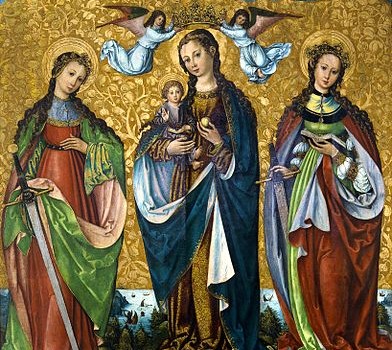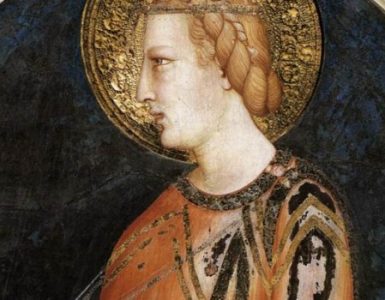Saints Perpetua and Felicity, along with several Christian companions, were put to death for their faith at the beginning of the third century. Many legends about the early martyrs are dubious, but an authentic account of the imprisonment and death of Perpetua and Felicity was preserved, written in part by Perpetua herself (from her diary) and by another martyr, and completed after their executions by an unknown Christian.
Perpetua was a young noblewoman of Carthage (a city in North Africa), the daughter of a Christian mother and a pagan father. It is believed that she was a widow, for she also had an infant son. Felicity was a married slave girl, far advanced in pregnancy. The two women and three fellow catechumens — Saturninus, Secundulus, and Revocatus — had been converted to Christianity by a layman named Saturus; they were baptized while under house arrest for refusing to worship the pagan gods, and when they were transferred to the common jail, Saturus voluntarily joined them.
Felicity gave birth to a girl while enduring the taunting of an unfriendly jailer; this child was adopted and raised by a fellow Christian. Perpetua was worried about her own son, who for a time she kept with her in jail, until her parents took the child home. Perpetua wrote a description of her father’s visit: “When my father in his affection for me was trying to turn me from my purpose by arguments and thus weaken my faith, I said to him, ‘Do you see this vessel — waterpot or whatever it may be? Can it be called by any other name than what it is?’ ‘No,’ he replied. ‘So also I cannot call myself by any other name than what I am — a Christian,’” Perpetua explained.
The six Christians refused to renounce their faith, and all were sentenced to death during public games in the amphitheater in 203. Saints Perpetua, Felicity, and their companions were first mauled by wild animals and then put to death by the sword; reportedly the executioner was so shaken by Perpetua’s brave and noble demeanor that she herself had to guide his blade to her neck.
Lessons
1. Christians may be called upon to endure great sufferings — but if so, God will sustain them. In her diary Perpetua wrote, “What a day of horror! Terrible heat, owing to the crowds! Rough treatment by the soldiers! To crown all, I was tormented with anxiety for my baby…. Such anxieties I suffered for many days, but I obtained leave for my baby to remain in the prison with me, and being relieved of my trouble and anxiety for him, I at once recovered my health, and my prison became a palace to me, and I would rather have been there than anywhere else.”
2. Jesus said, “Whoever loves father or mother more than Me is not worthy of Me” (Matthew 10:37).
St. Perpetua showed love and respect to her father, but she did not forget her primary identity: a Christian called to follow in the footsteps of her Master.
Other Saints We Remember Today
St. Thomas Aquinas (traditional day), Priest, Religious, Doctor, The Angelic Doctor, Patron of Catholic Schools, Scholars, Theologians, and Booksellers
image: The martyrdom of Perpetua, Felicitas, Revocatus, Saturninus and Secundulus, from the Menologion of Basil II (c. 1000 AD)










